Prosperity Fund annual report 2020 to 2021
Published 26 May 2022
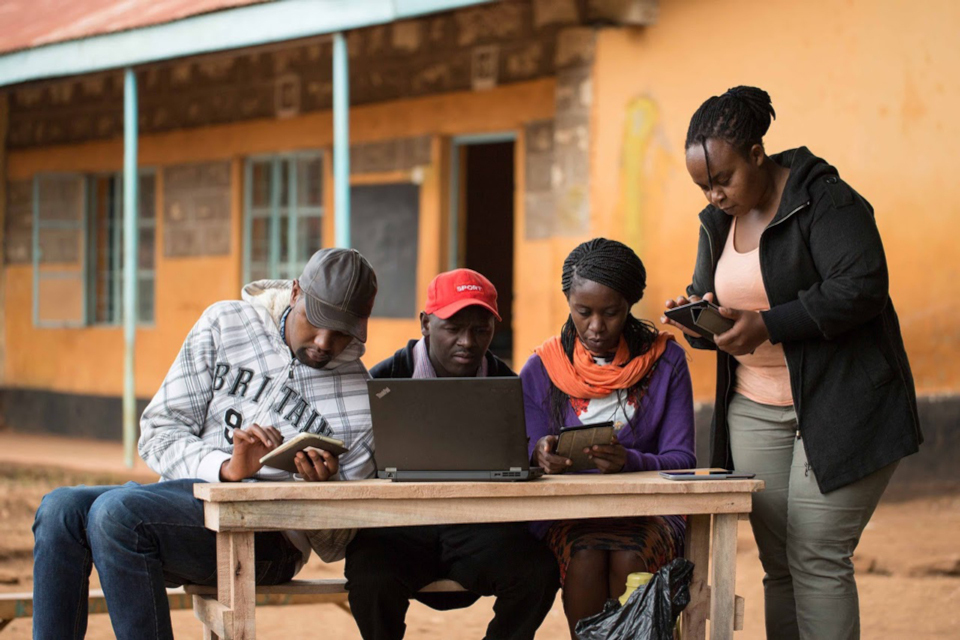
Executive summary
This fifth and final Prosperity Fund Annual Report demonstrates how the UK Government has worked to promote prosperity in partnership with governments and the private sector across over 20 emerging and fast-growing economies where development challenges persist. It details the progress and achievements, made in the Financial Year 2020/21 across the portfolio, which cover many areas relevant to successful delivery of the United Nations’ Sustainable Development Goals (SDGs).
The cross-government Prosperity Fund operated between 2016 and 2021 to promote the inclusive economic growth needed to reduce poverty in partner countries, whilst contributing across a range of SDGs. Prosperity Fund ODA-funded interventions were targeted towards supporting partner countries to promote trade and investment, develop more resilient and inclusive cities, improve infrastructure, healthcare systems, build skills, and increase access to low carbon energy, digital technology and finance. For example, the UK’s 5 Case Model for infrastructure planning was adopted for 41 major projects in Indonesia and 2 projects in Colombia, and 5 Case Model principles were integrated into national guidance in both countries through programme support.
Development across these key themes has supported citizens and entrepreneurs to better access economic opportunities. The Fund‘s focus on strengthening the business environment helps to give businesses predictability and stability through better laws, standards and access to finance. For example, the ASEAN Economic Reform programme supported Vietnam and Myanmar to integrate international standards and good practice into judicial mechanisms for reducing corruption. In addition, the Colombia programme supported the development of a digital marketplace app allowing almost 2,000 farmers to access wider networks to market, helping their prices rise by up to 23%.
The Prosperity Fund has been a catalyst for inclusive and more climate sustainable economic growth in partner countries, whilst also benefiting people and business beyond borders, including in the UK. In Thailand, a bank and a renewable energy generator each issued green bonds after the ASEAN Low Carbon programme raised awareness of green bonds and provided technical support. Worth GBP 270 million in total, the green bonds are an important step in developing markets for green finance in South East Asia.
Despite the COVID-19 pandemic presenting a significant challenge for the programmes; the UK government’s decision to move to a target of spending 0.5% of GNI as Official Development Assistance (ODA) in 2021, the Prosperity Fund delivery teams demonstrated innovative ways to continue to deliver outcomes. In this financial year the Prosperity Fund spent £248.0 million of which £239.3 million was ODA and £9.0 million non-ODA.
The cross-government Prosperity Fund ended on 31 March 2021 and prosperity programming has now moved to the Foreign, Commonwealth and Development Office.
The Prosperity Fund in 2020 to 2021: key achievements at a glance
The Prosperity Fund worked across 5 themes essential to improving conditions for inclusive growth and poverty reduction. For further detail see the Theory of Change in Annex 2.
Intermediate Outcome One: Investment in Infrastructure
The Prosperity Fund improved the ability of partner countries to develop greener, and more inclusive infrastructure. Over the lifetime of the Prosperity Fund, 142 infrastructure project concepts and pilot projects have been developed, many using UK best practice methodologies in project planning, preparation and delivery. In 2020/21:
- the Global Infrastructure Programme delivered training for over 2,000 international officials in Building Information Modelling and nearly 2,000 in Infrastructure and Projects Authority (IPA). Such training received high satisfaction ratings and in some cases partner governments co-funded further training
- the Colombia Programme supported the Colombian government to develop a strategy on rail development addressing outdated regulatory norms and laws, to build an adequate institutional environment for rail reactivation. The programme also helped the National Infrastructure Agency to reform internal corporate governance and develop a G&I policy, with potential to shape projects and working practices of infrastructure companies
Intermediate Outcome Two: Human Capital, Innovation and Technology
The Prosperity Fund helped partner countries to invest in their people, businesses and knowledge base. Over the lifetime of the Prosperity Fund over 27,000 people have participated in capacity building activities related to human capital, innovation and technology. In 2020/21:
- in Brazil, the Global Skills Programme built expertise and capacity for improving English language teaching to over 4 million young Brazilians, across 5 states, in middle and high school to improve their career opportunities in line with the national government’s language reform
- the Digital Access Programme trained 13,966 digital entrepreneurs of which 71% were women. This helped facilitate business partnerships, including between UK-based and partner country-based organisations with mutual benefits in terms of innovation and opportunities for investment
Intermediate Outcome Three: Trade
The Prosperity Fund supported partner countries to engage and attract regional and global trade. To date the Prosperity Fund has trained 400 stakeholders and developed 26 learning and resource platforms and tools as a result of the work of the Global IPP programme to attract foreign trade and investment. In 2020/21:
- the newly launched Trade Forward Southern Africa will support exporters across Southern Africa to start or grow their export business, having trained over 100 officials in risk management and analysis to improve customs processes
- the Brazil Trade Programme supported, through a partnership with well-known e-commerce company, 120 women-led small to medium sized business with training to increase online trading and exports leading to increased online sales for 61% of the companies
Intermediate Outcome Four: Financial and Economic Reform
The Prosperity Fund drew on UK and international expertise so that partner countries can mobilise finance to fund their own development. To date 56 policies and practice have been reformed towards deeper and more stable, inclusive and innovative financial systems. In 2020/21:
- in Indonesia, the UK continued to support the Ministry of Economic Affairs to develop implementing regulations and subsequent policies under the Job Creation Law passed in October 2020
- the Business Environment programme supported China to upgrade its anti-money laundering system to meet the Financial Task Action Force global standards and avoid being grey-listed, greatly reducing the risk of illicit finance flows and enhancing global financial security for the UK
Intermediate Outcome Five: Ease of Doing Business
The Prosperity Fund helped partner countries to improve their business environment, including through reducing corruption. Over the Fund’s lifetime over 23,000 stakeholders have been engaged in capacity building activities and over 328,000 stakeholders have engaged with Prosperity Fund knowledge, products, and platforms as a result of the work of the Global Anti-Corruption and Business Environment programmes. In 2020/21:
- the China Business Environment programme successfully advocated the removal of specific restrictions on China’s Foreign Investment Law in 2020, creating a more level-playing field for other businesses and investors including from the UK
- in Nigeria, the Global Business Environment programme laid the foundations for the new Companies and Allied Matters Act (CAMA), which was signed into law in August 2020 after 3 decades of no significant business legislation amendments. CAMA makes it easier to start a business, including through new electronic methods
- UK experts worked closely with Vietnamese counterparts to provide technical assistance and share experiences to support the development of Resolution 68 to simplify and streamline business activity regulations
The UN Sustainable Development Goals:
The Prosperity Fund was aligned to all of the UN’s SDGs. In particular it supported SDG 8 Decent Work and Economic Growth: Promote sustained, inclusive and sustainable economic growth, full and productive employment and decent work for all.
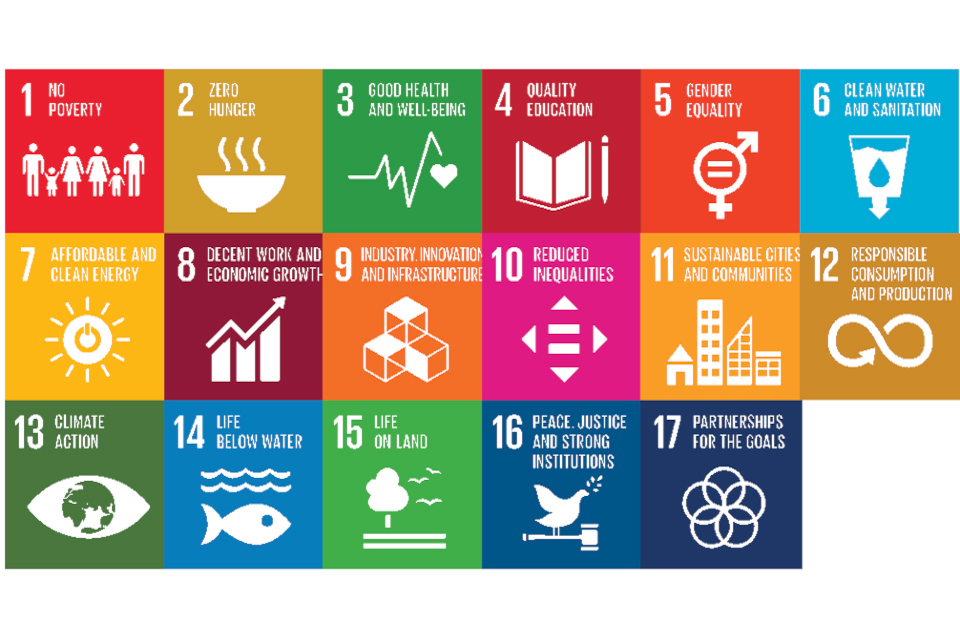
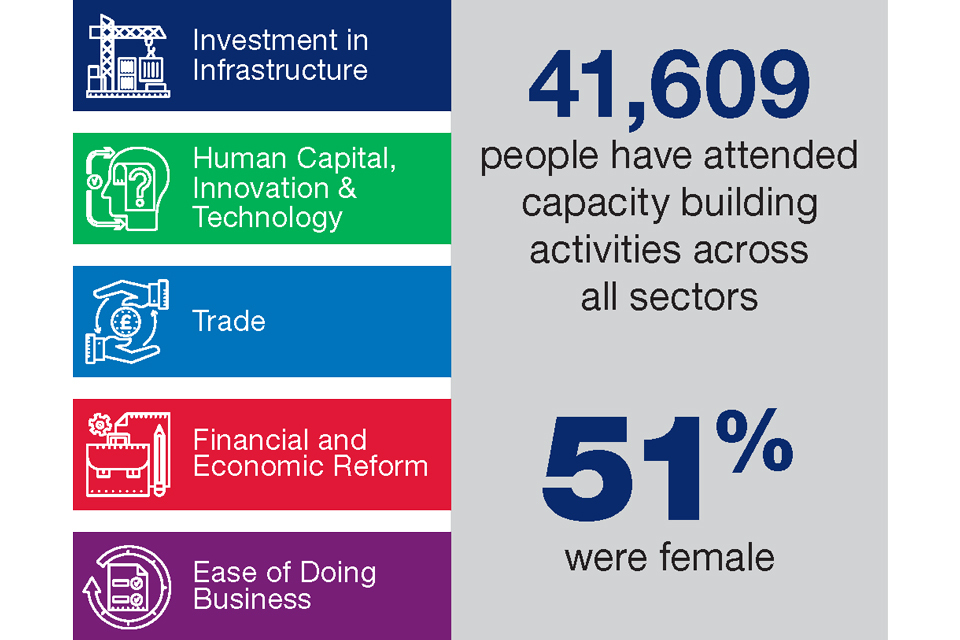
Investment in Infrastructure;Human Capital, Innovation & Technology; Trade; Financial and Economic Reform; Ease of Doing Business. 41,609 people have attended capacity building activities across all sectors 51% were female
Promoting economic partnerships
The Prosperity Fund showed that the concept of an Official Development Assistance (ODA) programme, based on the principle of mutual prosperity supported the SDGs and can be successfully put into practice.
- a recent independent Fund Level Evaluation concluded that the Prosperity Fund contributed to delivering commercial benefits for business (including UK firms) estimated to the value of GBP 1.62 billion, measured in terms of exports and investments generated from programme activity up to December 2020
- the same evaluation concluded that the Prosperity Fund was also a helpful tool of economic diplomacy and cooperation, shaping development outcomes and economic and financial dialogue in its countries of focus
- in South Korea, PF projects generated opportunities for UK firms looking to do business, contributing to £6 million in total export wins in this financial year, including in priority sectors such as offshore wind and urban planning
- following the positive relationships formed, 90 UK-made double decker buses were exported into Mexico City, supporting Mexico’s green ambitions while benefiting the UK
- the Colombia programme supported improvements to quality, productivity and sustainability of Colombia’s cacao production. These improvements have created economic opportunities and fostered entrepreneurship for small farmers, in particular for women
- a small proportion of non-ODA Prosperity Fund resource (total £35 million over 5 years) has helped to explicitly promote opportunities for UK businesses in priority Prosperity Fund countries
COVID-19
During 2020/21, the Fund continued to face the challenge of the pandemic. Programmes flexibly and proactively adapted to ensure ongoing delivery and relevance to both shorter and longer term economic recovery and ‘building back better’, with additional technical support from the Prosperity Fund Covid 19 Evidence and Learning Initiative in collaboration with K4D (Knowledge for Development programme at the Institute of Development Studies). Snapshots from PF programme responses include:
- the Global Better Health Programme successfully pivoted to focus on quality of care and managing Non-Communicable Diseases (NCDs) in a COVID-19 environment. This included supporting development of standards and tools for use in South Africa to inspect field hospitals across the country
- the Global Trade Programme with the Trade Forward Southern Africa (TFSA) scheme focused work with Namibia, Lesotho, Botswana and Mozambique governments to identify policy options to counter the impacts of COVID-19, recommending solutions geared to help the business community trade and grow in the aftermath of the pandemic
- Brazil’s Green Finance Programme developed a methodology to integrate Environmental, Social and Governance (ESG) criteria into stimulus packages for economic recovery from the COVID-19 crisis among Development Finance Institutions (DFIs) and Commercial Banks
- the Brazil Future Cities Programme promoted handwashing practices in of the state of Pernambuco. COMPESA (Pernambuco’s water utility) created a public washbasin using reused materials and installed 129 basins in 22 bus terminals across Recife Metropolitan Region and 38 in public places
- the Digital Access Programme worked with the South African government to provide digital teacher training to teachers throughout the pandemic, to improve their technical competency and enable them to deliver remote learning. In Brazil, the programme worked with local partners to produce locally-relevant digital content for more than 1,200 people living in isolated rural areas during the pandemic, adopting replicable low-cost models. In Kenya, the Programme enabled 3,499 community health workers to administer COVID-19 related telemedicine assistance to underserved communities in 7 counties, with a specialised focus on people living with disabilities and women
- in South Africa the Global Future Cities Programme, at the request of the Cities, augmented projects to support the pandemic response. Data strategy projects that were originally going to be used to assist the City in providing services (transport, water, electricity) to their Citizens were used to assist the City understand those areas worst affected
- the Colombia Programme helped develop the Open Contracting Dashboard which facilitated monitoring and analysis of procurement and is an example of a tool highly relevant to ensuring accountability as governments looked to increase spending in response to the pandemic
Introduction: Promoting economic partnerships
The Prosperity Fund began its work in 2016 to promote inclusive economic growth. The focus was on middle income countries, where 62% of the world’s poor people [footnote 1] live, and where there continue to be significant development challenges and barriers to meeting the Sustainable Development Goals. Prosperity Fund interventions were developed through consultation and targeted to support partner countries in key areas pivotal to growth—e.g. trade and investment, infrastructure, healthcare systems, and skills, and to enable access to low carbon energy, digital technology and finance.
Development across these areas gives people and businesses the tools and opportunities to work in stronger, more productive economies, which helps to reduce poverty. It enables people to access services and work opportunities, helps them to enforce their rights, and gives businesses the predictability and stability they need through formal laws, standards and access to finance. The Fund recognised that the private sector is vital for economic growth—creating jobs, increasing trade, providing goods and services to the vulnerable, and generating the tax revenue required to fund essential public services, such as health and education.
The Prosperity Fund aimed to respond to an increasing demand from developing countries for economic relationships based on trade, investment, and exchange of expertise, rather than aid, and, where there is still a rationale for ODA, for it to be catalytic, experimental and innovative.
Programmes drew on areas of UK strength valued by partners such as finance, technology, infrastructure, low carbon energy, and health and education; actively positioning the UK as a partner of choice in key policy areas and business sectors.
In an uncertain world, building economic partnerships overseas through careful use of ODA helps keep the UK safe too. The Prosperity Fund made the most of the knowledge available across government and our international partners to tackle complex global challenges such as corruption and climate change, recognising that many of the challenges the UK and the rest of the world face stretch well beyond national borders.
The Prosperity Fund worked in 5 key thematic areas, identified as intermediate outcomes in the Fund’s Theory of Change, see Annex C, all of which are designed to improve conditions for inclusive growth in partner countries, whilst aligning with the UN SDGs. In this reporting period the fund started to deliver results at the intermediate outcome level.
All Prosperity Fund ODA-funded programmes met the Organisation for Economic Co-operation and Development’s (OECD) Development Assistance Committee’s ODA criteria. They also aligned with the International Development Act 2002, International Development (Gender Equality) Act 2014, aimed to contribute to the Fund’s primary purpose of promoting inclusive economic growth. In supporting partner countries to mitigate and adapt to climate change, the Prosperity Fund also contributed to wider UK Government climate efforts.
Official Development Assistance country, region and sector focus 2020/2021
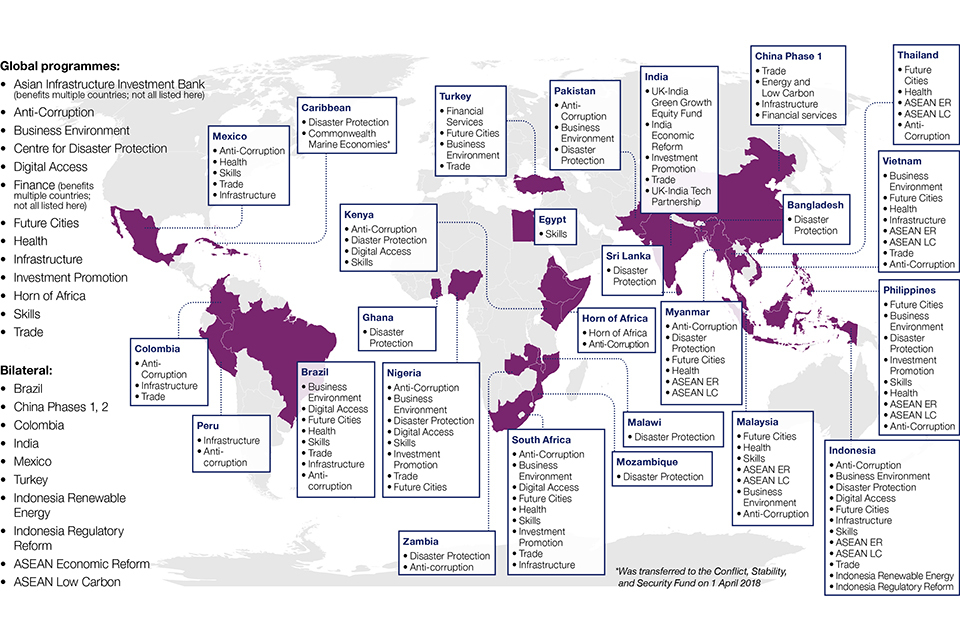
Programme activity in 2020/21
This section provides details of programmes’ progress during 2020/21, together with key SDGs targeted. The Foreign, Commonwealth & Development Office was the lead department in each case for the majority of the Financial Year, but most programmes involved several government departments.
ASEAN Economic Reform
SDGs:
- 1 (no poverty)
- 5 (gender equality)
- 8 (decent work and economic growth)
- 16 (peace, justice and strong institutions)
The Prosperity Fund ASEAN Economic Reform programme operated at a regional level and in the 6 largest South East Asian countries (Indonesia, Malaysia, the Philippines, Thailand, Vietnam, and Myanmar) to help strengthen business environments, and broaden financial markets.
In Indonesia, technical cooperation with Indonesia’s Financial Services Authority (OJK) on peer-to-peer (P2P) lending regulations enhanced consumer and investor protection. In Malaysia, the programme generated research which developed a Waqf, an Islamic Finance product to support vulnerable communities to mitigate against the impact of natural disasters (such as flooding).
In the Philippines, a connection between Bangko Sentral ng Pilipinas (BSP) with the UK Financial Conduct Authority (FCA) supported their learning on global regulatory approaches to Fintech. This culminated in BSP becoming a member of the FCA supported Global Financial Innovation Network (GFIN). The Programme facilitated official-level participation in the Cambridge FinTech and Regulatory Innovation (CFTRI) executive online programme, enabling officials from Indonesia, Philippines and Thailand to understand the key innovative technologies and business models applied by FinTech firms and to help determine regulatory policy.
On regulatory reform, Vietnam adopted Government Resolution 68/ND-CP to simplify and streamline business activity regulations, modelled on the UK Government’s Administrative Burdens Reduction Programme (ABRP). Specifically, the UK shared its experience of their One-In, Two-Out (OITO) initiative. This helps prevent government policymakers from creating new regulations that inadvertently increase costs for business and voluntary organisations. In Indonesia it supported the introduction of a risk-based approach for operational business licensing in October 2020.
In the Philippines, UK regulatory technical assistance led to the adoption of the Philippine Good Regulatory Principles, and the Reengineering Manual supporting the Whole-of- Government Approach in Streamlining Philippine Government Systems and Procedures in delivering Public Services.
ASEAN Low Carbon Energy
SDGs:
- 1 (no poverty)
- 5 (gender equality)
- 7 (affordable and clean energy)
- 13 (climate action)
The ASEAN Low Carbon Energy programme promotes inclusive economic growth in the region by aiding increased green finance flows for low carbon energy and improving energy efficiency, mainstreaming Gender and Inclusion considerations throughout.
The Programme supported Thailand’s Bank for Agriculture and Agricultural Cooperatives (BAAC) to issue its first green bond. BAAC was then able to finance sustainable agricultural projects by allocating proceeds from bond sales to environmental conservation, forest protection and promotion of sustainable agriculture.
Across the ASEAN region, the programme promoted better energy efficiency strategies. This included supporting national and regional progress on implementing Minimum Energy Performance Standards (MEPS) across a number of countries, developing policy roadmaps with Thailand and the Philippines to inform energy efficiency policy and regulation and supporting studies to improve the use of thermal energy efficiency in the Food and Beverages sector in Malaysia. We also established the Malaysia Sustainable Finance Initiative with the Malaysian Securities Commission, boosting green finance, and contributing to our COP26 objectives.
The programme conducted the first G&I regional webinar with GenderSmart, a network focused on unlocking gender smart investment, and Sagana, an impact investing and advisory firm, to explore “Opportunities for Integrating Climate and Gender Finance”. In February 2021, the GenderSmart Summit report aimed to demystify gender-smart climate finance and reframe thinking about the nexus between climate and gender finance and includes ASEAN-focused data to illustrate the size of the gender-climate financing opportunity in the region.
Better health
SDGs:
- 1 (no poverty)
- 3 (good health and well being)
- 8 (decent work and economic growth)
- 17 (partnerships for the goals)
The Global Better Health Programme (BHP) began in 2019 to address the burden of Non-Communicable Diseases (NCDs), such as heart disease and diabetes, the improvement of treatment and management of such conditions especially in women and marginalised groups and by improving equitable access to improved quality of care and contributing to a healthier population. BHP’s 8 original partner countries (Mexico, Brazil, South Africa, Thailand, Vietnam, Malaysia, Philippines and Myanmar) are all working towards or aspire to universal health coverage.
The programme worked closely with relevant government organisations through collaboration between the FCDO, NHS Arm’s Length Bodies (ALBs) and the Department for International Trade (DIT).
The BHP drove forward its primary aid objectives in the health through its technical collaboration activities. This included successfully pivoting to focus on quality of care and managing Non-Communicable Diseases (NCDs) in a Covid-19 environment. Collaboration with health authorities in Malaysia helped complete surveys of lifestyle impacts of lockdown on the urban poor population, and informed innovative virtual and hybrid approaches to engaging such communities in NCD prevention. Engagement with senior officials in South Africa shaped strategies for inspecting primary care and hospital services, and in South East Asia BHP delivered successful nursing and medical curriculum reviews in relation to pandemic response.
As well as benefits to the UK in the form of exports and investment opportunities, the Programme contributed to strengthening health partnerships and health diplomacy with its partner countries. FCDO and the NHS Consortium for Global Health worked closely with the Department for International Trade on opportunities, including the new NHS Export Collaborative initiative. By the end of 2020 to 21, the BHP contributed to 8 commercial wins including new export deals and 78 non-commercial wins including opportunities to raise the profile of the UK and the offer from its health sector and to strengthen key relationships.
The Programme developed a Global Learning Strategy, part of which included formation of a Technical Working Group (TWG) consisting of our Delivery Partners, NHS and BHP Health Advisers.
Brazil
SDGs:
- 1 (no poverty)
- 7 (affordable and clean energy)
- 9 (industry innovation and infrastructure)
- 11 (sustainable cities and communities)
Doing business in Brazil is challenging with poor physical infrastructure and complex regulatory frameworks. Growth and access to the benefits of trade suffer as a result. The programme in Brazil covered trade, ease of doing business, green energy transition and infrastructure. Better functioning markets drive prosperity and poverty reduction, creating opportunities and incentives for firms to invest, grow and generate jobs.
The Brazil Trade Programme organised an online matchmaking event that brought together 340 Brazilian micro, small and medium enterprises (MSMEs). The event included information sessions to help Brazilian MSMEs better understand international market opportunities and trends to help boost Brazilian exports and link UK firms to competitive MSME suppliers in Brazil.
The Brazil Energy Programme developed an award-winning digital platform to capture information on Brazilian investments in Research, Development and Demonstration (RD&D) of energy technologies. The Energy Innovation Platform (EIP) drew together best practice in technological innovation systems, to focus on the transition to renewable energies in Brazil. An initial version of the digital platform, developed in partnership with Brazil’s Energy Research Office (EPE) and Centre for Management and Strategic Studies (CGEE), won the PAINEL Award of Best Innovation Project, an award supported by the Instituto Beasc de Humanidades e Economia.
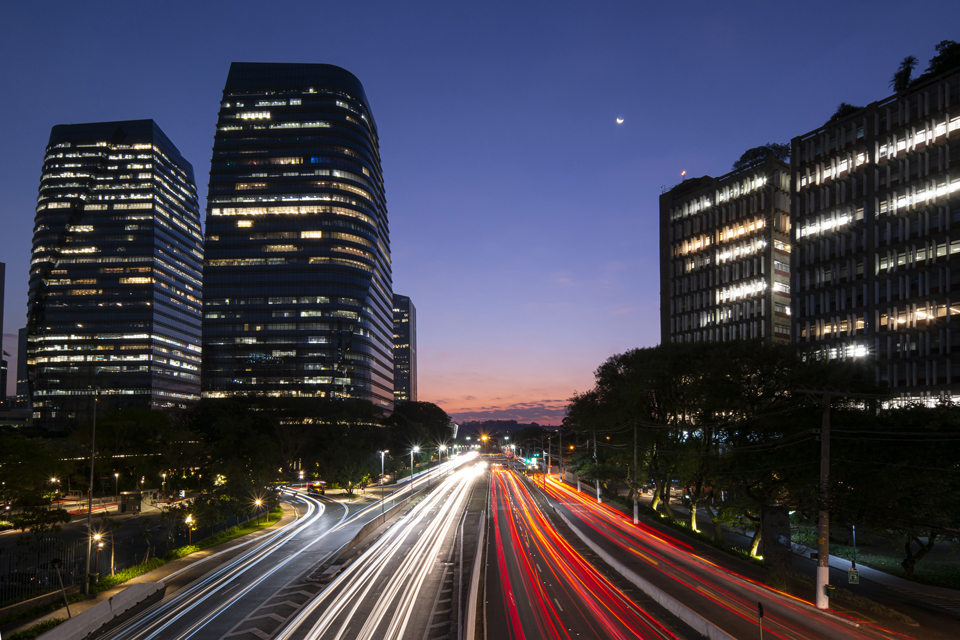
The Brazil Energy Programme’s support to offshore wind (OSW) accelerated development of the sector in the country, by supporting analysis of environmental and socioeconomic impacts of OSW, as well as building understanding of the business environment, port infrastructure, electric power transmission systems, and investment partnerships. Subsequent proposals for more inclusive regulatory frameworks, and an Investors’ Guide for entrepreneurs and investors was praised by the Brazilian Ministry of Energy.
The Brazil Future Cities Programme worked with COMPESA (Brazil’s water utility) to improve management of non-revenue water. This is water that is produced but lost before it reaches consumers. The programme also developed a gender action plan with COMPESA to create a more gender-balanced company environment, aimed at empowering women, enabling income generation and reducing water losses in properties.
The programme was able to deliver technical, economic and financial recommendations for the use of 5G in traffic lights and different real-time traffic control strategies in the city of São Paulo, as well as to provide consolidated references to improve legislation regarding urban logistics and micro-accessibility solutions. Consequently, the municipality of São Paulo created a forum to exchange knowledge about the future of mobility, including the use of digital tools leveraged in the Programme.
Centre for Disaster Protection
SDGs:
- 1 (no poverty)
- 9 (industry innovation and infrastructure)
- 11 (sustainable cities and communities)
- 13 (climate action)
The Centre for Disaster Protection programme is the UK’s flagship Disaster Risk Finance (DRF) technical assistance programme. It supported developing countries and the humanitarian and development community to strengthen their pre-disaster planning and financial arrangements so they can better manage crisis and disaster risks, thereby reducing the impact on people and helping to safeguard economic development. Supported through a partnership between the UK Government (particularly FCDO, the Government Actuary’s Department (GAD), Met Office and Department of International Trade (DIT), the World Bank, research institutions and the private sector.
The Programme supported the delivery of several knowledge products, diagnostic and analytical notes, analytical tools and inputs to a range of continuing global initiatives. The programme performed a technical review of post-disaster expenditures in Kenya to inform the implementation of the government’s DRF strategy, producing a number of recommendations including investment in a tracking system to collect information on post-disaster expenditures and support to vulnerable Ministries, departments, and agencies (MDAs) to prepare annual financing plans to allow for disasters.
The programme helped expand the Disaster Risk Finance Community of Practice from 4000 members in 2020 to 7000 members in 2021 and has contributed towards the development of over 25 knowledge updates and products.
The programme helped finance 3 webinars as part of a Certification Series on Disaster Risk Financing for Agriculture, which received over 900 registrations from over 20 countries. In Pakistan, The DPP supported a 2.5-hour online training session on Disaster Risk Financing for the National Disaster Risk Management Agency, as well as training on catastrophe modelling for around 25 staff of Mozambique’s Ministry of Economy and Finance and other relevant line ministries and select academics.
The Government Actuary Department and the Centre for Disaster Protection launched a new report with IFRC on forecast-based financing for humanitarian response, maximising IFRC’s available humanitarian resources.
China
SDGs:
- 1 (no poverty)
- 9 (industry innovation and infrastructure)
- 13 (climate action)
- 16 (peace, justice and strong institutions)
China’s economic progress impacts development outcomes around the world, making it an important global partner for meeting the UN SDGs.
Programme recommendations on how international judiciaries handle force majeure have fed directly into the Supreme People’s Court’s guiding opinions on handling civil cases involving the COVID-19 epidemic, enhancing legal certainty and supporting SMEs and improving investor confidence. Supported by non-ODA funding, we have removed the mandatory legal requirement on animal testing for cosmetics through the adoption of international standards, a major barrier for UK firms. This will allow UK firms to access a £54bn market in China.
Our energy and low carbon strand work led to the establishment of a UK-China centre on carbon capture and storage that supported the launch of a new multi-million pound demonstration project in South China. We have influenced 5 recommendations for China’s 14th Five Year Plan in sectors such as electric vehicles and renewable energy.
Our financial services strand fostered collaboration between the Bank of England and Chinese counterparts on macro-economic stress testing, and assessing climate risk in economic planning. Robust macro-economic stress testing will support financial stability in China, the UK and wider markets.
Colombia
SDGs:
- 1 (no poverty)
- 5 (gender equality)
- 8 (decent work and economic growth)
- 11 (sustainable cities and communities)
Despite the high growth rates seen over the last 3 decades, Colombia still faces considerable development challenges, including high levels of inequality. The programme focused activities on governance, infrastructure and agriculture, aiming to create new economic and employment activities whilst promoting gender equality.
On transparency and anti-corruption, the programme aimed to build capacity of stakeholders in 9 regions within Colombia to use public procurement data to improve decision-making and service delivery. By December 2020, all target regions were producing and sharing better quality data as they adopted the e-procurement platform SECOP II noting a significant increase in competitive processes and numbers of bidders.
The programme supported Bogotá’s adherence to CoST in 2021, the infrastructure transparency initiative. The programme also supported the National Infrastructure Agency to implement CoST standards for infrastructure procurement. A significant number of reliable, updated and easy to use indicators are now available to improve information disclosure and comparability, encouraging citizen participation and oversight, more comprehensive competition, and broader investor involvement
The programme contributed to improving the productivity and sustainability of Colombia’s cacao production. A data analytics platform was developed to help smallholder farmers improve both quantity and quality of yields. The cacao produced by Yanira, Martha and Carmen, in only 3 harvests, was transformed in the UK into award-winning chocolate bars, receiving the Great Taste, the International Chocolate Awards, and the Academy of Chocolate Awards in 2020.
Colombia has an ambitious target to reduce carbon emissions in 51% by 2030, and the UK played a critical role in helping delivery. The programme aimed to inform the construction of the greenest airport in Latin America, Aeropuerto del Café. The pioneering adoption of Building Information Modelling (BIM) tools provided a more effective and cost-efficient design, and the methodology to manage the Airport’s carbon footprint has been already incorporated to increase climate ambitions, create consciousness, and identify opportunities to reduce GHG emissions.
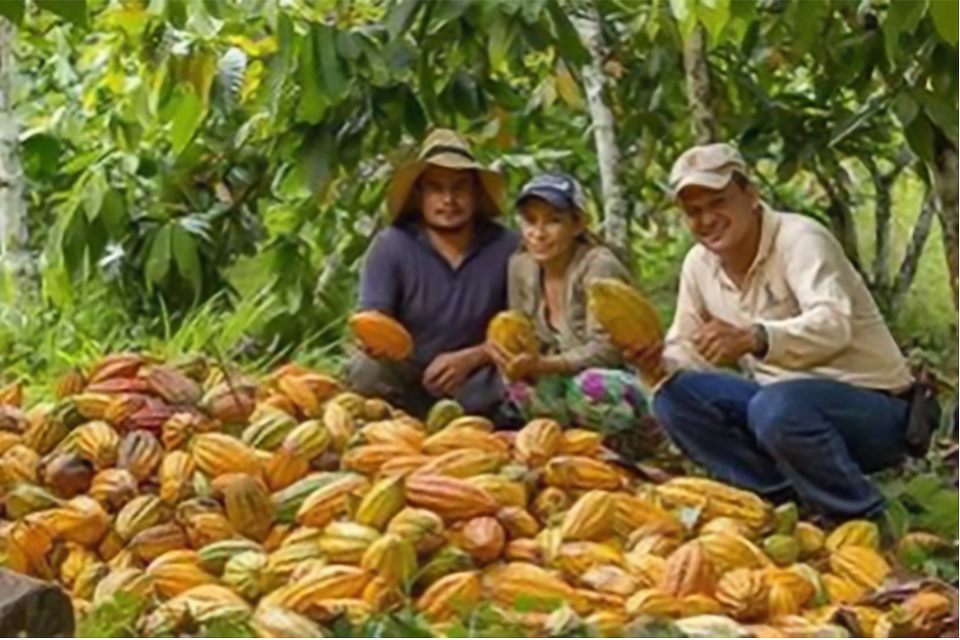
Digital Access
SDGs:
- 1 (no poverty)
- 5 (gender equality)
- 9 (industry innovation and infrastructure)
- 11 (sustainable cities and communities)
The Digital Access Programme (DAP) helped over 2.3 million people access inclusive, affordable, safe and secure connectivity and digital services, and develop digital literacy and skills, in nearly 300 under-served communities across Kenya, South Africa, Nigeria, Brazil and Indonesia.
The Programme enabled development of 18 national digital access plans, policies, strategies and regulations, including the National ICT Plan in Kenya (see cover photo), a community networks policy framework in Brazil, the National Broadband Plan in Nigeria and the Digital Inclusion in Telemedicine Strategy in Indonesia.
The Programme provided support to the Government of Nigeria’s update to its National Cyber Security Strategy, bringing it in line with international best practice. In Nigeria, the DAP trained over 6,000 individuals from over 3,000 SMEs in cyber security essentials, aligned to UK CyberEssentials standard; and a successful cyber-hygiene awareness campaign reached over 46 million people through social media and radio.
The Programme also supported the work of Future Female Business School (FFBS) across the 5 programme countries to train over 1,200 female-led enterprises—with 40% of targeted start-ups having a ‘green tech’ and climate change focus.
The UK-Indonesia Tech Hub component of the Programme launched the ‘Tech to Empower’ project empowering 100 people with disabilities to become digitally-ready entrepreneurs through digital literacy and business skills training.
Global Anti-Corruption
SDGs:
- 1 (no poverty)
- 5 (gender equality)
- 8 (decent work and economic growth)
- 16 (peace, justice and strong institutions)
The Global Anti-Corruption Programme promoted inclusive sustainable growth and increased global prosperity through strengthening public expenditure management and domestic revenue mobilisation; reducing levels of corruption; and, encouraging more effective, accountable and transparent institutions.
The programme established the International Anti-Corruption Coordination Centre (IACCC). Successes to date include 2 major asset recoveries in Malaysia of US$3.9 billion and Angola of US$2 billion. The UK was awarded an Anti-Corruption Award, by the Malaysian Anti-Corruption Commission, partly in recognition of the help the UK had provided particularly through its law enforcement, beneficial ownership and asset recovery programmes.
The programme funded the OECD Global Anti-Corruption & Integrity Forum which helped develop and share best practice approaches to addressing corruption. In 2021 the Forum attracted more than 2,000 government, business and civil society participants from over 120 countries.
In South Africa the UK was instrumental in helping the National Treasury establish a spend data and conflicts of interest dashboard, thus assisting their efforts in beneficial ownership.
The Global Anti-Corruption Programme sought new opportunities for interventions as the pandemic highlighted the importance of anti-corruption work. The Transforming Procurement Systems (TPS) is a collaborative effort between the UNODC, Open Contracting Partnership, and Open Ownership. It can support reforms to ensure procurement processes are fairer and more transparent.
Global business environment
SDGs:
- 1 (no poverty)
- 5 (gender equality)
- 8 (decent work and economic growth)
- 16 (peace, justice and strong institutions)
The programme, delivered in partnership with the World Bank, supports reform efforts to improve the business environment in 9 partner countries. The programme’s analysis has reached more than 40,000 readers around the world, and informed 29 reforms in countries beyond those directly assisted by the programme.
The programme supported policy development for Indonesia’s most ambitious investment liberalisation in recent decades, opening up more than two-thirds of previously restricted business activities to foreign investment. Early WBG estimates suggest that this liberalisation may generate US$3.8 billion and US$1.5 billion in additional foreign and domestic investments respectively.
In the Philippines the programme supported passage of 2 regulations to remove obstacles to investing in the mobile telecommunications sector. These twin reforms led to opening up the mobile sector to foreign investors and the acceleration of the rollout of telecom towers nationally, increasing speeds by almost 17% and benefitting businesses and households alike.

In Pakistan the programme helped the Board of Investment (BOI) design and launch a new, targeted investment promotion strategy in August 2020. It will benefit investors by improving BOI’s investor service delivery, including support for solving investor grievances and strengthened advocacy for regulatory reforms in priority sectors.
Global Finance
SDGs:
- 1 (no poverty)
- 8 (decent work and economic growth)
- 9 (industry innovation and infrastructure)
- 10 (reduced inequities)
The Global Finance Programme extended the reach of the financial sector to previously excluded populations, strengthening individual resilience and allowing more people to access economic opportunities and basic financial services.
The programme contributed to our understanding of the impacts of COVID-19 on the FinTech market and FinTech regulation, bringing the Cambridge Alternative Finance Collaboration Network (CAFCN) together with the World Bank and World Economic Forum.
The Cambridge Fintech Regulatory Innovation (CFTRI) programme informed and enabled evidence-based regulatory changes, which corresponded with a 40% increase in the number of upcoming FinTech enabling regulatory initiatives within the CAFCN regions.
The programme’s Catalyst Fund (CF) launched an e-voucher scheme in partnership with Sokowatch and Uweza, an NGO that supports youth and children living in the Kibera slum in Kenya. The scheme supported informal SME retailers and vulnerable households in Kibera respond to COVID-19.
The CF successfully delivered venture building support to 12 Fintech companies. For every US$1 of support provided to start-ups by FCDO, these companies raised US$34 in follow-on capital, and reached 289,000+ end customers.
The IMF Financial Sector Stability Fund (FSSF) responded to COVID-19 through relevant and timely support to manage emerging financial stability risks. FSSF-funded IMF activities helped conduct financial stability diagnostics and advanced bank supervision and stress testing, as well as hands-on assistance to at least 40 countries on financial statistics issues.
Global Future Cities
SDGs:
- 1 (no poverty)
- 5 (gender equality)
- 9 (industry innovation and infrastructure)
- 11 (sustainable cities and communities)
The Global Future Cities Programme continued its work to promote inclusive and sustainable urban development. The programme moved to full intervention during 2020/21 with further achievements likely to be realised beyond this review period.
In Turkey, Ankara Transport has delivered the bicycle masterplan linking marginalised neighbourhoods with the industrial parks cycling road.
In Yangon the city delivered a concept design for street upgrades, providing good pilots of accessibility audits conducted by and for persons with disabilities.
Bangkok’s river basin is vulnerable to annual flooding with severe flooding in 2011 affecting over 13 million people causing £43bn in damage. The Bangkok Metropolitan Administration previously relied on a reactive response to rainfall with only 20% of the city in good coverage of a rain gauge network. The Mott McDonald delivery partner developed the Decision Support System (DSS) for flood management resilience. This system processes data 300,000 times faster than conventional flood models allowing a 2-hour rainfall prediction in advance helping the city prepare and respond to potential flooding.
Capacity building focused on developing improved institutional processes incorporating Gender, Equality and Social Inclusion (GESI) considerations, project management and strategic sector planning. Following pandemic restrictions these sessions were delivered remotely which had the benefit of including more beneficiaries. In Vietnam, 78% of the officials reported the training programme to have a positive impact on their work.
In Lagos Waterways, Future Cities Nigeria (FCN) successfully engaged informal boat operators to identify ways to formalise water transport.
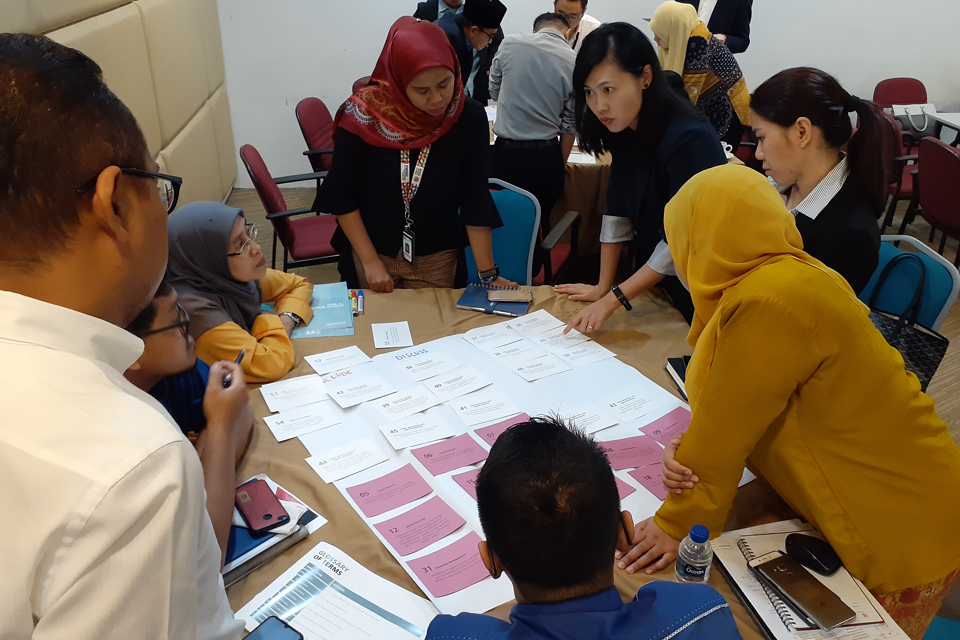
Beneficiary of a GFC workshop. Copyright UN-Habitat
Global Infrastructure
SDGs:
- 1 (no poverty)
- 8 (decent work and economic growth)
- 9 (industry innovation and infrastructure)
- 11 (sustainable cities and communities)
The GIP was a collaboration between the FCDO, Infrastructure and Projects Authority (IPA) and the Department for Business, Energy and Industrial Strategy (BEIS), delivered through its partner, the Centre for Digital Built Britain (CDBB). Working across Latin America, Southeast Asia and Sub-Saharan Africa, the programme disseminated best practice infrastructure methodologies in partner countries.
The Infrastructure and Projects Authority (IPA) with Centre for Digital Built Britain launched the Global BIM Network which will act as a mechanism for Global Infrastructure Programme partner countries to sustain and expand their national efforts to embed the Building Information Modelling (BIM) methodology.
The CDBB supported Brazil, Colombia and Peru to publish partial or full mandates for public projects to use Building Information Modelling (BIM) ISO 19650 (the international standard for managing information over the cycle using BIM) was published in Colombia, and drafts are in development in Brazil, Peru and Vietnam, which provides a technical framework consistent with UK principles.
Global Trade
SDGs:
- 1 (no poverty)
- 5 (gender equality)
- 8 (decent work and economic growth)
- 17 (partnerships for the goals)
The programme is working with Indonesia, Vietnam (and wider Southeast Asia), Brazil, Mexico, Nigeria, Turkey, members of the Southern African Custom Union (SACU) (South Africa, Namibia, Botswana, Lesotho, Eswatini) and Mozambique to help remove non-tariff barriers (NTBs) to trade. In doing so this improves access to regional and international trade promoting innovation and growth.
The Southern Africa Customs Union (SACU) Customs Modernisation Programme incorporated activities to address barriers faced by women export traders in SACU.
In Vietnam, the National Trade Repository (NTR) information portal was developed to include outreach to and input from marginalised groups, such as women entrepreneurs, to ensure gender and inclusion is embedded throughout project designed to encourage participation in international trade.
Though the World Bank Group, the programme strengthened capacity of National Trade Facilitation Committees to implement the Trade Facilitation Agreement in 5 partner countries. The World Customs Organisation worked to improve the capacity of the customs organisations of partner countries, including with regard to integrity, gender sensitivity and human resource management.
Mexico
SDGs:
- 1 (no poverty)
- 8 (decent work and economic growth)
- 11 (sustainable cities and communities)
- 16 (peace, justice and strong institutions)
The programme worked to address key obstacles to economic development across a range of areas including urban development, anti-corruption and the rule of law, low carbon energy and financial services.
In September 2020, Mexico reached a milestone in Fintech regulation with the selection of the first cohort of companies to enter its ‘regulatory sandbox’ through the Sandbox Challenge 1.0. The competition promoted the usage of the Mexican sandbox and its regulations. 166 entrants represented a range of sub-sectors and technologies, showcasing the dynamism of Mexico’s Fintech entrepreneurs. Fintech is a key part of tackling financial inclusion in Mexico where 60% of the population remain without bank accounts but 70% have access to the Internet.
Following the successful delivery mobility projects from the Mexico Future Cities programme, the authorities of the Metropolitan Area of Guadalajara adopted new policies to support mobility with a gender and inclusion focus. The programme supported the city to expand transport subsidies to vulnerable groups in the Metropolitan Area of Guadalajara aims to improve the access to affordable, safe, inclusive and sustainable transport, including for over 11,000 women.
In March 2021, Mexico City’s mayor made permanent previously-temporary bicycle lanes on the largest avenue in the city, following recommendations from the Future Cities Programme.
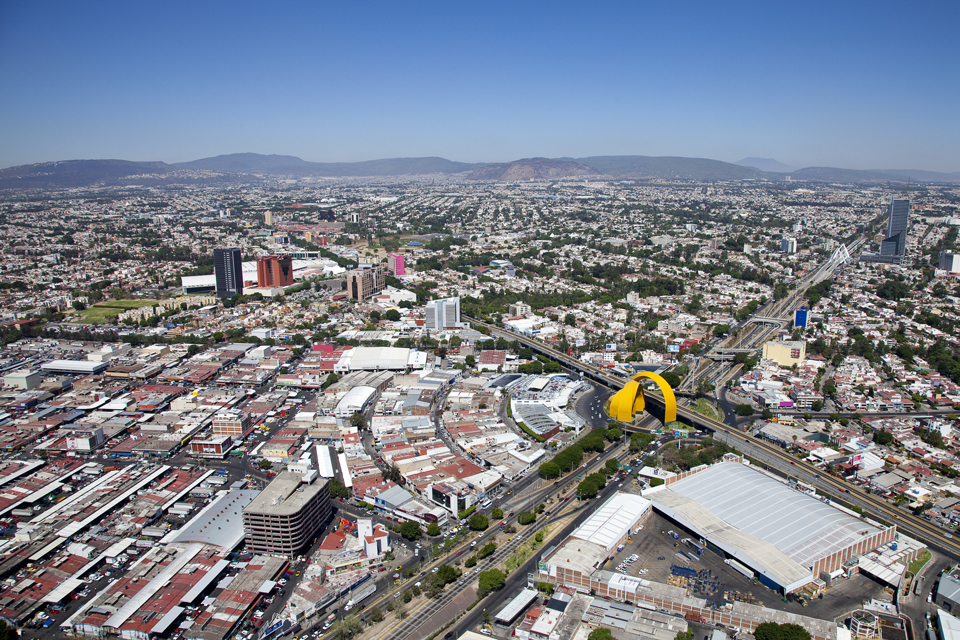
Unlocking Prosperity in the Horn of Africa
SDGs:
- 1 (no poverty)
- 9 (industry innovation and infrastructure)
- 10 (reduced inequities)
- 13 (climate action)
The Horn of Africa includes one of the worlds’ busiest shipping lanes and trading routes, via Berbera Port in Somaliland. The Horn’s trade corridors provide access to the sea from land-locked countries including Ethiopia—home to over 100 million people, one of Africa’s fastest-growing and diversifying economies, and yet where poverty rates remain stubbornly high.
The programme worked alongside the Abu Dhabi Fund for Development to construct a 22.5km bypass around Hargeisa, coupled with investments in trade and transit facilitation and local economic development for citizens of Somaliland and Ethiopia, living along the corridor.
Wider contributions included ensuring a participatory, cultural and gender-sensitive approach to upgrading the Tog Wajaale market, benefitting 296 women traders dealing in horticulture and livestock products.
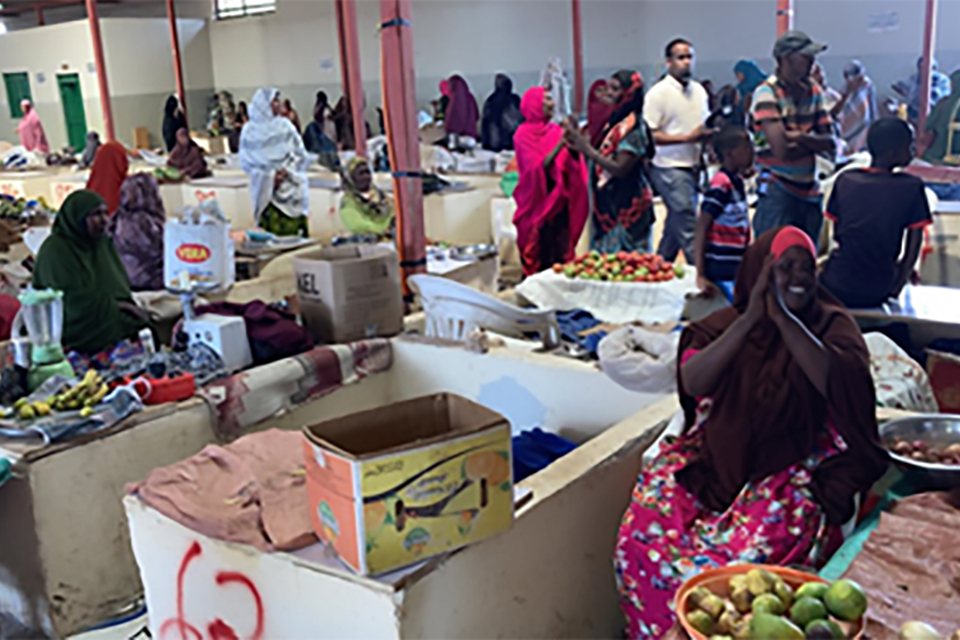
Unlocking opportunities for the UK
SDGs:
- 1 (no poverty)
- 9 (industry innovation and infrastructure)
- 10 (reduced inequities)
- 13 (climate action)
In working to promote inclusive economic growth, the Fund also generates benefits for the UK, in the form of exports, investment, mitigating the risks of climate change or threats to public health, and strengthening of international rules and norms around trade, investment, and security. It also helps Global Britain to be seen as positive and constructive force for good internationally.
Activities to help deliver commercial benefits for the UK specifically are not eligible for ODA funding. The Prosperity Fund included a small component of non-ODA funding (approximately 3% of the total Fund) to help generate opportunities where there is currently little or limited support for UK business, and where there is a relatively small UK Government footprint. In 2020/21, non-ODA funding supported various initiatives to promote and assist UK private sector expertise in a range of partner countries, including through campaigns, workshops, educational programmes, research, visits, networking and knowledge sharing.
The non-ODA element of the Fund is part of the wider toolkit available to Government to support favourable trading conditions for both the UK and its partners. Other resources included Trade Commissioners and Trade Envoys, as well as support from Department for International Trade staff in embassies all over the world, and in the sector teams in the UK.
Examples of successes supported by Prosperity Fund non-ODA resources in 2020/21 include:
- the Global Finance Programme supported Standard Life to become the first foreign company to open a pensions/insurance business in China, with a short-term expected value to the UK in excess of £100m
- the Global Business Environment delivered £5m in commercial wins, through intellectual property legislation that stopped counterfeit production of UK companies’ products in China (BP and Premier League)
- as a result of an aspect of Mexico programme funded with non-ODA resources, a Lincolnshire-based firm was able to secure an export win worth £1.9M for the provision of steel for the construction of the new airport near Mexico City
- the collaborative effort between DIT’s Security Advanced Engineering sector and the Prosperity Fund’s Opportunities Fund in Mexico resulted in 2 export wins worth £4 million in total for a West Midlands-based material management and recycling solutions company
- Guy’s and St Thomas’ NHS Foundation Trust and Thailand Centre of Excellence for Life Sciences signed a Memorandum of Understanding on Genetic Counsellor capacity building to support Thailand’s development of medical genomics and precision medicines
- headquartered in Yorkshire, a network security solutions provider was able to secure its first contract in Mexico, opening the door for future collaborations in sectors such as financial services, banking, pharmaceutical and corporate services
- a London-based company managed to secure a contract renewal for their National Network for Water Quality Measurement worth £4M in August 2020
- UK companies are already taking advantage of Global Business Environment reforms, for example 2 UK companies have made use of the new investment grievance mechanism that GBE helped to establish in Brazil

Climate change
The Prosperity Fund proactively implemented the UK Government’s commitment to align all ODA with the principles and objectives of the Paris Agreement. A mid-2020 internal review showed that over 99% of the portfolio was aligned with the 4 pillars of Paris alignment set out in the Green Finance Strategy. Activities not aligned were either modified or closed.
The Portfolio conducted further research and programme modification, to confirm that planned technical assistance for gas market reform was Paris aligned. Business planning processes introduced shadow carbon pricing mechanisms, starting with a component of the Global Trade Programme.
As one of the largest climate funds in emerging economies, the UK-India Green Growth Equity Fund was successful in attracting new investors despite the Covid-19 pandemic. At the time of this Report, GGEF had received £145m of funds from private sector and multilateral investors, taking the total fund size to ~£460 million. The investment platforms generated 913 direct jobs and reduced ~430,000 tonnes of carbon emissions, thereby contributing to International Climate Finance (ICF) Key Performance Indicators.
Following closure of the Prosperity Fund, the FCDO continued many lines of programme activity, underpinned by FCDO’s policy on Paris alignment. Through their unique contributions to climate change mitigation and adaptation, several of these programmes continued to help the UK Government to deliver COP26 priorities to help Middle Income Countries reduce emissions and improve climate resilience while sustaining economic growth. Activities included deploying world-leading expertise from UK and international business, the UK Government and multilaterals.
Gender and inclusion
The Fund continued to make progress towards delivering its primary purpose of poverty reduction through inclusive economic growth. It is likely that benefits already delivered for women and excluded groups will continue to increase in future as the impacts of reforms supported by the Fund take effect.

The Prosperity Fund’s ambition on Gender and Inclusion (G&I) was to ensure economic growth interventions led to benefits for women and excluded groups. The Fund’s final cross-cutting thematic evaluation on G&I identified that despite the impact of COVID-19 and subsequent ODA reprioritisation, programmes continued to improve performance on promoting G&I outcomes. The evaluation found that PF programmes adopted approaches aligned with widely accepted drivers of women’s economic empowerment, and targeted interventions in ways likely to benefit other excluded groups. The Fund promoted cross programme learning and capacity building through its cross-government G&I Champions Network and G&I Framework tools.
The Prosperity Fund contributed towards macro-level institutional or policy changes that benefitted women and excluded groups, including people with disabilities. It also contributed to improvements in integrating G&I considerations into a range of planning, policy making, funding, capacity building, data collection, employment and contracting processes.
- the ASEAN Low Carbon Energy Programme influenced the gender sensitivity of regulatory development in the Philippines. G&I considerations are now included in government data collection requirements among energy sector companies. Regulations relating to the delivering of energy efficiency projects now have to consider and monitor impacts on different social groups
- the Mexico Future Cities programme helped public transport authorities in Guadalajara bring a poverty and gender-based perspective to address women’s mobility needs. The programme supported city officials to adjust the fare subsidy system to target women aged 25-65 on lower incomes to improve their access to employment opportunities
- in Colombia, the Fund supported integrating gender equality for competitiveness and innovation strategic planning, including project selection and access to jobs, in the plans of 8 Regional Competitiveness Commissions. In the city of Manizales officials committed to adopting recommendations from people with visual impairments to provide tactile signage and audio announcements for greater disability inclusion in public buses and bus stations.
- The Colombia Programme provided technical support to the country’s National Procurement Agency and the Presidential Counsellor for Women’s Equity (CPEM) to make procurement legislation more inclusive, by regulating differential criteria to promote access of women-led businesses and entrepreneurship to the public procurement market
- the Brazil Future Cities programme helped the São Paulo Transit Authority integrate G&I considerations into design and planning, including plans to create channels for reporting sexual harassment and abuse and to promote women in transport agencies
- the Global Business Environment Programme supported reforms in South Africa and Nigeria to make it easier to start up a micro, small or medium-size enterprise (MSMEs), with the potential to particularly benefit women entrepreneurs given that most formal businesses owned by women are MSMEs. In Nigeria, the Programme also helped the federal government develop a standard model bilateral investment treaty that includes gender considerations. The model treaty provides a template for bilateral agreements with other countries
- the Global Digital Access Programme helped to strengthen digital literacy of marginalised entrepreneurs in Indonesia by delivering a 6 month virtual training to over 150 female entrepreneurs. 90% of participants created digital marketplace accounts and 50% of those received orders soon after training
- the Global Anti-Corruption Programme supported stronger integration of gender considerations into the UN Office on Drugs and Crime’s (UNODC) anti-corruption work through closer linkages with the UNODC’s Gender unit
- in Mexico, the Global Skills Programme partnered with the PepsiCo Foundation to launch a gender awareness advertisement campaign in the state of Jalisco, called “Vocation has no gender”. The aim is to challenge stereotypes and encourage young women to pursue STEM careers
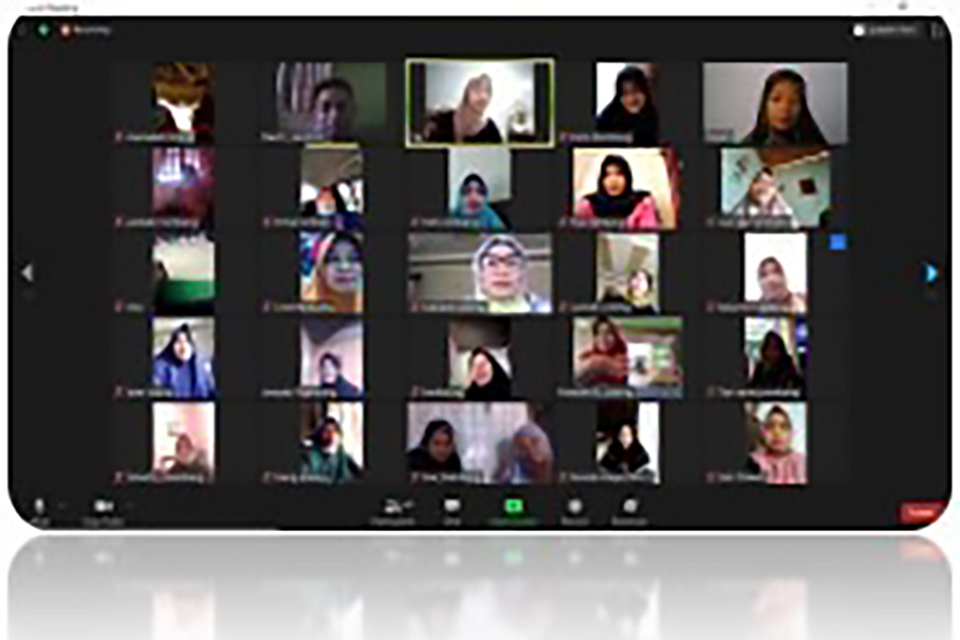
Participants on the Digital Literacy for Marginalised Female Entrepreneurs in Indonesia Webinar (Digital Access Programme)
Monitoring, reporting, evaluation and learning (MREL)
To maximise impact and drive value for money, a proportion of the Prosperity Fund budget was set aside for monitoring, reporting, evaluation and learning (MREL). The amount spent on MREL contracts were approximately 4.5% of the total value of the PF. MREL services were delivered through a consortium PA Consulting which led the Monitoring and Reporting with the evaluation and learning consortium led by TetraTech with Integrity and LTS/Niras International (EL).
These activities generated evidence to inform decision-making, ensure more effective and transparent delivery, and to help manage risk. It also contributed to the evidence base on partnerships formed with countries. MREL activities supported the Fund through 3 cross-cutting areas:
- Technical support helped programmes to develop tools to track programme performance, adapt as contexts change and apply learning
- Innovative digital platforms enable consistent reporting of results, interactive dashboards to support portfolio decision-making and a peer exchange to share best practice and learning, through the Prospero Platform
- Robust information management, as well as annual evaluations of programme and Fund performance from independent experts, drives transparency and accountability
Evaluation and learning
Evaluation and learning (E&L) are important functions to help ensure a focus on key objectives, maximise impact, Value for Money, and manage risk. While supporting accountability, this was not the primary purpose of EL; instead, learning activities were intended to help generate an evidence base (on primary purpose and secondary benefits), help improve the effectiveness of PF programmes, support sharing of knowledge across the fund and inform communication of impact. EL was set up to address the needs of different stakeholders:
- at fund level EL would assess the extent to which PF is contributing to inclusive economic growth and delivering secondary benefits to businesses
- EL informed thinking on future approaches, through synthesising lessons from programmes and cross fund evaluation of particular themes, supported by the PF Learning Platform. A survey in 2020 found 71% of PF staff were using the information on PF Learning in their work, with it widely recognised as having a significant and positive contribution to learning
- at programme level it would test the theories of change and establish, while the programmes were operating, whether they are delivering the outputs and outcomes that will likely lead to impact
By the end of the contract the EL team delivered 19 programme evaluations, 1 sector level evaluation, 8 thematic evaluations and 3 fund-level evaluations. The delivery of technically robust and independent evaluation products with clear recommendations for programme teams and JFU lead to improved evidence base on mutual prosperity, secondary benefits and cross-government ODA delivery. This evidence will support future FCDO programming by offering lessons, guidance and insights into the successes of the Prosperity Fund.
Annex 1: Financial information 2020 to 2021
ODA Spend by Department (total: £239.3m)
| FCDO | HMT | CO | DIT | DCMS | NCA | |
|---|---|---|---|---|---|---|
| Amount | £212.6m | £9.9m | £9.6m | £3.9m | £2.0m | £1.3m |
| Percentage of the total | 88.8% | 4.2% | 4.0% | 1.6% | 0.8% | 0.5% |
DFID and FCO data have been combined to reflect the creation of FCDO in September 2020
Spend by programme (in £million)
| Programme | Spend |
|---|---|
| Global Future Cities | 29.7 |
| Global Trade | 20.3 |
| Global Health | 20.1 |
| Brazil Prosperity | 16.5 |
| Digital Access | 16.0 |
| China (Phase 1) | 15.6 |
| Mexico | 14.3 |
| Skills for Prosperity | 12.2 |
| Global Anti-Corruption | 9.8 |
| Asian Infrastructure Investment Bank | 9.3 |
| Global Finance | 8.9 |
| MREL | 7.4 |
| Centre for Global Disaster Protection | 6.5 |
| India Economic Reform & Prosperity | 6.5 |
| Horn of Africa | 6.3 |
| Colombia | 6.1 |
| ASEAN Low Carbon Energy | 5.6 |
| Global Business Environment | 5.5 |
| ASEAN Economic Reform | 5.1 |
| Global Infrastructure | 5.0 |
| Central Delivery Units | 4.7 |
| Investment Promotion | 3.9 |
| Indonesia Renewable Energy | 2.1 |
| China (Phase 2) | 1.0 |
| India Tech Partnerships | 0.6 |
| China (Phase 3) | 0.2 |
| Turkey Financial Services | 0.1 |
2020 Calendar year ODA spend
All Departments report on ODA spend on a calendar year basis via the OECD Development Assistance Committee (DAC). Total UK ODA spend in 2020 was £14,479 million of which the Prosperity Fund contributed £206.5 million (1.43%). The vast majority of the Prosperity Fund’s spend supported bilateral ODA activities.
2020/21 financial year spend
Total Prosperity Fund spend in FY 20/21 (April 2020 to March 2021) was £248.0 million of which £239.3 million was ODA and £9.0 million non-ODA.
Annex 2: Theory of change
A Theory of Change provided the basis for planning at Fund and programme level, programme design and management, and indicators for assessing impact. It explained the journey from near-term outputs and activities through to long-term poverty reduction. Programmes also had project-specific theories. Beyond intermediate outcomes, economic theory will demonstrate that the Fund contributed positively to the UN Sustainable Development Goals.
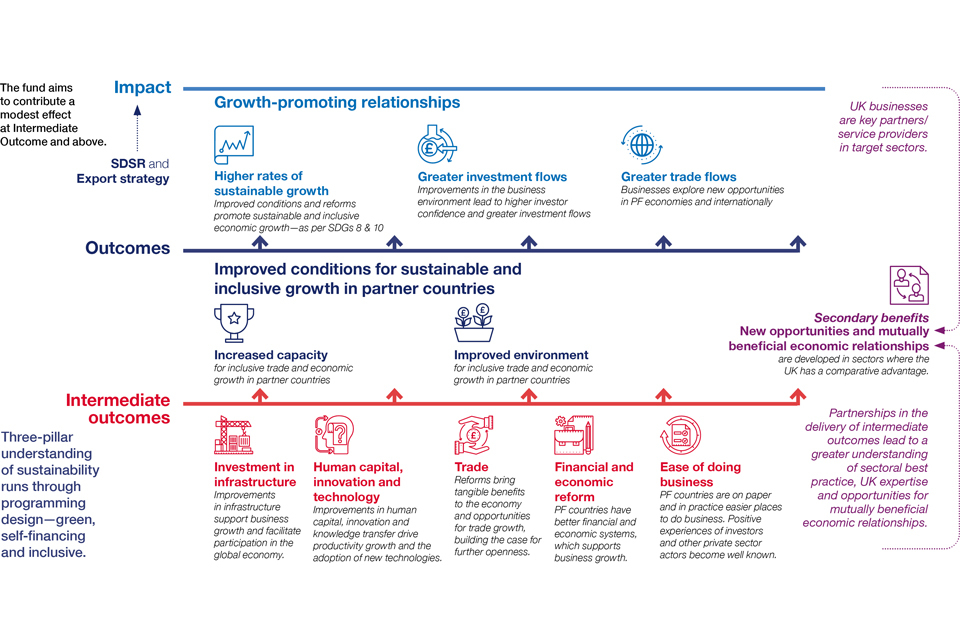
Annex 3: Results of aggregated outputs by intermediate outcome; from Prospero Platform, April 2021
- Within the Investment in infrastructure Intermediate Outcome, the Fund developed 169 project concepts and pilot projects, often using UK best practice methodologies in project planning, preparation and delivery; and trained over 9,300 partner government officials and partner organisation stakeholders to develop improved transport systems, urban planning frameworks and climate resilience strategies
- To contribute to knowledge transfer, PF interventions within the Human Capital, Innovation and Technology (HCIT) Intermediate Outcome built the capacity of over 29,000 people accounting for 46% of all capacity building activities delivered within the PF portfolio. HCIT Interventions also facilitated the largest number of partnerships/collaborations (89), indicating that building partnerships and increasing collaboration is seen as an important approach within PF interventions towards increasing innovation and productivity. In driving secondary benefits, opportunities for UK businesses, the HCIT also accounted for about 92% of commercial opportunities recorded on Prospero
- Interventions within the Trade Intermediate Outcome trained 2,305 stakeholders and developed 53 learning and resource platforms or tools, to reinforce intellectual property rights and build capacity within partner countries to attract foreign trade and investment
- In the Financial and Economic Reform Intermediate Outcome, programmes delivered 56 reforms to financial and economic policy and practice
- Within the Fund’s Ease of Doing Business Intermediate Outcome realised 155 reforms to policies, standards or practice, accounting for 54% of the Fund’s results to date in this area
Source: Prosperity Fund Thematic Portfolio Analysis Report (PA Consulting, April 2021)
